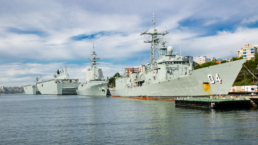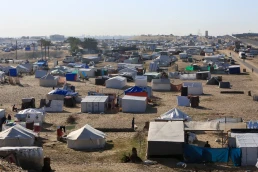There is an alarm in Australia about a Chinese military threat. This is a typical feature of the war system.
By Brian Martin, TRANSCEND Media Service
From a European perspective, Australia is remote geographically and would seem to be an unlikely place for there to be fears of impending war. Australia is an island continent, has a stable government, is a major exporter of natural resources and a tourist attraction, and has no neighbours showing imperial ambitions. The country would seem to be as safe as anyone could hope. Yet for the past couple of years, there has been a drumbeat of alarm about the possibility of war. With what country, you might ask. The answer is China, Australia’s biggest trading partner.

Watching war fever being drummed up in Australia gave me an eerie feeling. Last year I was finalising work on a book about how alarms about war are created and maintained. I was seeing my own analysis displayed in real life, with frightening consequences. The culmination came in March with the “red alert” stories in the Sydney Morning Herald and The Age, the most strident war-mongering I had seen for a long time. These two newspapers, the most respected in the country, put five experts in a room for a day. They came up with a prediction of war with China in the next three years. (Incidentally, why didn’t they pick five peace experts and put them in a room for a day?)
My book is titled Persistent Panics: The Wars on Drugs, Crime, Terrorism and War. My aim was to see patterns in these four “wars.” To do this, I drew on two bodies of social theory, those to do with moral panics and scientific controversies.
The longest chapter in the book is titled “The war on war.” As everyone knows, war is a major social problem. What is the solution? Amazingly, the dominant approach is to prepare for war, rather than promote peace. Euphemisms partly obscure this, by reference to “defence” though many preparations for defence can also be used for attack.
Let’s proceed through a bit of the analysis of war as a persistent panic. In a moral panic, there is an alarm raised about some group or practice that threatens social values. There have been moral panics about rock music, the drug ecstasy and stranger danger. Most of these emerge suddenly and then fade away. But some alarms do not fade away: they are persistent.
In a moral panic, there is something real going on, and it is defined as a threat. Chinese militarism is real, and it is a potential threat to Australia. But the threat is exaggerated. The last time the Chinese military engaged in a war was in 1979, against Vietnam. The idea of a Chinese invasion of Australia is fanciful.
Another feature of fostering war alarm is polarisation, the creation of an us-and-them mentality. Everyone in Australia is encouraged to think of themselves as part of “us” and the people in China as “them.” Then there’s another step: glorification and demonisation. “We” are encouraged to think of “ourselves” as great and good, while “they” are portrayed as the epitome of evil. There are stories about Chinese militarism — which may or may not have a core of truth — but no equivalent stories about Australian militarism. Or perhaps the thinking goes like this: Chinese militarism is bad because China is a danger but Australian militarism is okay because Australians are peace-loving people.
Chinese Invasion?
In a moral panic, there is something real going on, but the alarm is greatly out of proportion to the danger. Let’s look at the danger of the Chinese military invading Australia to take over the country.
From the Chinese military’s point of view, there is a danger from Australia, most prominently the US spy base at Pine Gap that is crucial to US nuclear war-fighting operations aimed at China. The top priority for a Chinese attack would be Pine Gap. After this would be other US military and intelligence bases. What can be done to reduce the danger of a Chinese attack? Easy. Get rid of US bases.
What next, from the Chinese point of view? Access to natural resources is important. So how about selling iron ore to China? Any sane strategist would realise that it’s cheaper and easier to buy natural resources rather than try to take over the country. Similar thinking applies to Chinese tourists being able to visit Australian beaches and Chinese students being able to attend Australian universities.
These ideas indicate the complete disjuncture between the alarm about a Chinese invasion and the actual danger. In reality, the war alarmists are preparing the ground for Australian participation in a war against China. The reason is not obvious. Chinese expansionism? There is just one Chinese foreign military base, while there are some 800 US foreign military bases, including ones near Chinese borders, for example in Japan and South Korea.
The genius of those who can be called “threat entrepreneurs” is to drum up an alarm about a potential threat when there is little evidence of actual danger. This is the classic configuration of arms races: each side builds up its military might because of the opponent’s, neither side acknowledging that its own arms are part of the spiral.
In the case of Australia, there has been a succession of enemies justifying war preparations and war-making, including Japan, North Korea, Soviet Union, Vietnam, Indonesia, Iraq, Afghanistan — and now China. The enemy may change, but there is always an alarm. To explain the persistence of military alarms, I turned to a different body of theory.
Scientific Controversies
Consider vaccination, fluoridation, nuclear power, pesticides. Over each of these issues, there are scientific facets, with evidence presented for and against a particular measure. What is distinctive is how these controversies persist over decades. The debate over fluoridation of public water supplies to reduce tooth decay in children got going in the 1950s and continues today, with much the same arguments. Several of the features of long-running scientific controversies apply to war as a persistent panic.
What about new evidence? You might expect that significant new evidence about, for example, the hazards of fluoridation, might lead to a shift in the debate. But no, this almost never makes a difference. Campaigners tout evidence that supports their views but ignore or discount contrary evidence. The same applies to war panics.
In 2021, the Australian government signed an agreement with the governments of Britain and the US, called AUKUS, to obtain nuclear submarines. Proponents of AUKUS dismiss contrary evidence, such as that future technology will make nuclear subs easy to detect or that the US has vastly more foreign military bases than China. Proponents do not seem to be bothered by the fact that the nuclear subs will not be delivered before the war with China predicted to occur within three years. Inconvenient facts are simply ignored.
Another sort of evidence is that it might be better not to have an army. The example of Costa Rica is instructive: it abolished its army in 1948 and since then has been far more prosperous than its militarily armed neighbours. However, the Australian government hasn’t sent a delegation to Costa Rica to learn from the country’s experience. Some lessons are not sought.
Another vital feature of war as a persistent panic is belief systems. Most people believe violence will always triumph over opponents that do not use violence, and therefore think violence is necessary for defence. However, there is a lot of evidence showing that nonviolent action — aka people power or civil resistance — can be effective in overthrowing ruthless dictators. Threat entrepreneurs do not mention this evidence, and ignore it when others raise it.
Think of this option. Rather than building up the Australian military and thereby posing a threat to others that fosters an arms race, what about building up the capacity of Australians to use methods of nonviolent action, both within Australia and to undermine the willingness of foreign populations to support aggression, and to support greater freedoms in China and elsewhere? This would not cost a lot and has the capacity to trigger a virtuous cycle of greater people power. But it’s not on the agenda. It clashes with the deep-seated belief in the power of violence.
Not incidentally, Australian governments are clamping down on nonviolent action by citizens, for example climate protesters. Rather than building the capacity for nonviolent resistance to aggression and oppression, governments seem to be trying to weaken this capacity.
Conclusion
In writing Persistent Panics, I came to a more pessimistic conclusion than I anticipated. The war system is deeply entrenched in most parts of the world, serving governments and arms manufacturers, with little prospect of being dislodged or superseded. There is a perpetual panic about foreign aggression, with little acknowledgement that military preparations perpetuate the problem of war.
There are some hopeful signs, including the great increase in awareness of the power of nonviolent action and experience in using it. But understanding the dynamics of persistent panics offers an important lesson: the problem of war is not going away soon, and certainly not going to be solved by more military spending. Activists need to think long-term and understand what they are up against.
Brian Martin is emeritus professor of social sciences at the University of Wollongong, Australia. He is the author of 22 books and hundreds of articles on dissent, nonviolent action and scientific controversies, and is vice-president of Whistleblowers Australia. Website: http://www.bmartin.cc – Contact: brian_martin@uow.edu.au
Recent Posts
Stop Israel’s Dystopian “Humanitarian City” Plan—Before It’s Too Late
July 11, 2025
Take Action Now For the past 20 months, the world has watched—and largely enabled—a genocidal campaign in Gaza. Over 55,000 Palestinians have been…
The “Liberal” International Order Is Criminalizing Palestine Protests
July 11, 2025
Take Action Now As Western governments repress Palestine solidarity and enable Israel’s impunity, the “liberal international order” is no longer…
Politicians Are Betraying Gen Z On Climate
July 10, 2025
Take Action Now While Gen-Zers thrift, knit, crochet, and find other ways to reduce our footprints, Trump and the GOP are greenlighting more climate…
Trump’s Deportation Threat Against Zohran Mamdani Is Shameful
July 10, 2025
Take Action Now In only half a year of Donald Trump’s presidency, he and his allies have turned deportation into an explicitly political threat…




